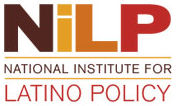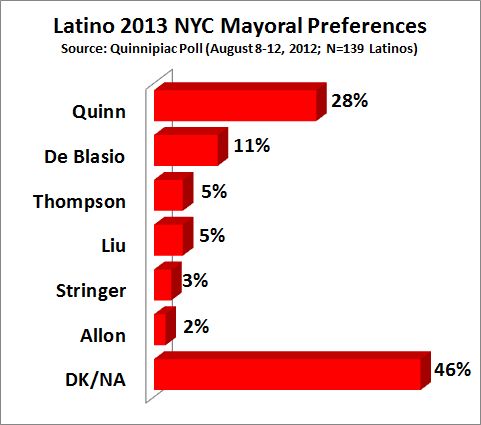 Latinos and the
Latinos and the
2013 NYC Mayoral Election:
Quinnipiac Poll August 2012 Results
By Angelo Falcón (August 20, 2012)
While the political focus today is on the Presidential election, New York City Latinos need to begin to discuss the role of their community in next year's Mayoral race. With Mayor Michael Bloomberg finally term limited, the mayoralty will be an open seat and the news media has begun the process of polling New Yorkers about their preferences. It is also important to note that beyond the election of citywide offices next year, New Yorkers will be voting for a newly-redistricted City Council .
There are currently no Latinos holding citywide office. The highest ranking current local government Latino elected official is Ruben Diaz, Jr., who is the Bronx Borough President. There are also 11 Latinos currently serving on the City Council, 2 of them term-limited (Joel Rivera, Democrat from the Bronx, and Diana Reyna, Democrat from Brooklyn).
At this point, no Latinos have officially declared to run for citywide office next year. Adolfo Carrion, the former Bronx Borough President, has indicated his interest to the media in running for Mayor. Fernando Ferrer, another former Bronx Borough resident and Mayoral candidate against Bloomberg in 2001, has begun to reemerge as a public figure in his role as Co-Chairman of Mercury Public Relations, generating speculation about his running again. Carrion had indicated his interest in 2009 in running for Comptroller but decided instead to join the Obama Administration, leaving, some argued, a major political vacuum at the time for Latinos in the city.
There is also speculation about current Bronx Borough President Ruben Diaz, Jr.'s interest in running for Public Advocate. Manhattan-Bronx Councilmember Melisaa Mark Viverito has also made her interest in running for Council Speaker known. Other such, as State Senators Gustavo Rivera and Adriano Espaillat have been mentioned in some circles as potential citywide candidates, but following the setback of their defeat in their challenge this year to Congressman Charlie Rangel, this speculation has waned somewhat.
2013 Mayoral Preferences
According to a Quinnipiac University Poll conducted this month , close to half (46 percent) of Latinos polled indicated they were undecided about who to support for Mayor in 2013 at this point (compared to 27 percent of Whites and 29 percent of Blacks). This would indicate that the Latino vote at this point is the most open of that of the city's major racial-ethnic groups.

Along with the other major racial-ethnic registered voters surveyed, Latino expressed their preference for Council Speaker Christine Quinn for Mayor (28 percent, compared to 35 percent for Whites and 24 percent for Blacks). She was followed in Latino support by Public Advocate Bill DeBlasio (11 percent). Bill Thompson, who ran a strong race against Mayor Bloomberg in 2009, receiving over 60 percent of the Latino vote then, only attracted a tiny 5 percent of Latino support in this month's poll. It is also interesting that Thompson, as the only African-American declared candidate, came in second in this poll to Quinn (he had 21 percent Black support to her 23 percent). This all indicates that at this early stage in the process, Mayoral preferences are very soft, especially for Latinos.


These findings on Mayoral preferences are fairly consistently with those of an April 2012 Marist Poll on the subject. Taken together, these polls indicate the softness of these early preferences, especially in the Latino case, where the percentage of undecides has grown from 34 to 46 percent, while remaining consistent for Blacks and Whites.
In a March 2011 Marist Poll , New Yorkers were asked to indicate their preferences for a list of hypothetical Mayoral candidates. What was interesting was that although this list of hypothetical, no Latino was listed, although former Bronx Borough President Fernando Ferrer had presented a strong challenge in 2001 to Mayor Bloomberg. At the time of this poll, we argued that there has been the practice by the mainstream media to erase significant racial-ethnic differences in poll results. The omission of any Latino in this Marist Poll listing of potential Mayoral candidates also raised questions about the impact this has in determining who are viewed as credible candidates.
Concerns on Sampling
The August 2012 Quinnipiac Poll that is the focus of this NiLP Latino Policy iReport was conducted on August 8-12 and surveyed 1,298 registered voters in New York City with a margin of error of +/-2.7 percentage points. It only polled 139 Latinos, which it weighted to represent 20 percent of the total sample (Quinnipiac's estimate of the Latino share of the city's registered voters). The margin of error for Latinos was +/-8.3, for Blacks (N=235) it was +/-6.4 and for Whites (N=796) it was +/-3.5 percentage points. This disparity in polling sample and thus accuracy among the city's major racial-ethnic groups continues to be cause for concern about the methodologies used by all the major polling firms conducting local surveys. It is also important to note that by limiting the universe to only registered voters, the results are also affected by important socio-economic and racial-ethnic disparities exis ting in the general adult population. Given the ever increasing importance of such polls, more attention needs to be given to these methodological issues as they impact on the measurement of the public opinion of the city's communities of color that constitute the majority of its population.
Angelo Falcón is President of the National Institute for Latino Policy (NiLP), for which he edits The NiLP Network on Latino Issues. He was a co-principal investigator on the landmark 1989-90 Latino National Political Survey (LNPS) and is co-editor of Latino Voices: Mexican, Puerto Rican and Cuban Perspectives on American Politics. He can be contacted at afalcon@latinopolicy.org .
